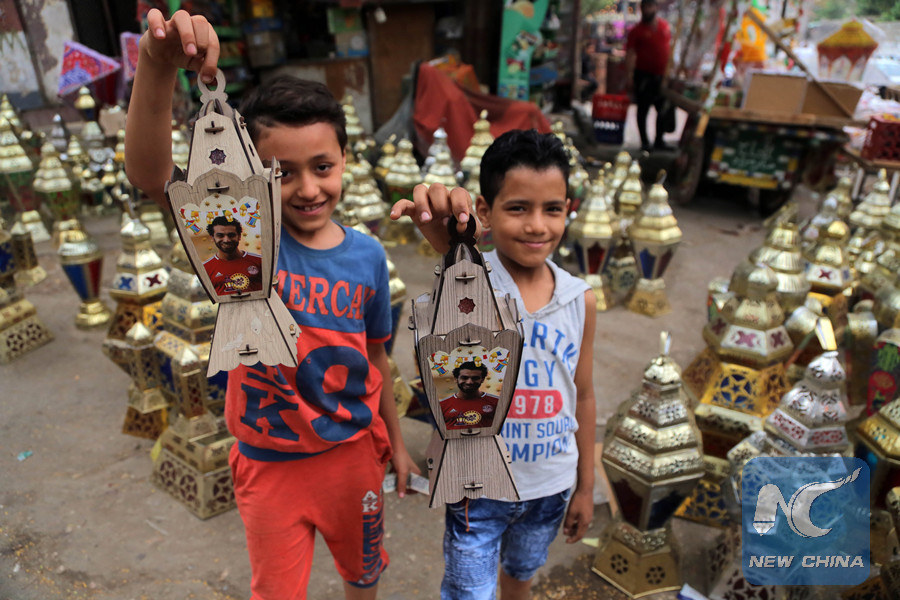
Traditional lanterns with images of football star Mohamed Salah are seen in a market in Cairo, Egypt, on May 4, 2018. (Xinhua/Ahmed Gomaa)
CAIRO, May 16 (Xinhua) -- Ahead of the holy Islamic month of Ramadan, Egyptians flock to local markets to purchase colorful lanterns, known as fanoos in Arabic, for their children or to use them as ornaments for homes and workplaces.
For Egyptians, buying fanoos is almost a must as it has been a tradition for centuries.
The lanterns, mostly handmade, garnish the streets and narrow alleys of Egyptian cities during the holiest Islamic month which starts on Thursday.
During the month, Muslims abstain from eating, drinking, smoking and conducting sexual relations from sunrise to sunset.
In the capital, buying a good lantern is worth a wearisome visit to the overcrowded market in Sayyida Zainab neighborhood, Cairo's largest lantern bazaar.
Despite this year's notable hikes in lanterns prices, Egyptians of all walks approached the markets to pick fanoos for their children as well as decorating their homes and home fronts.
"I'm looking for good-quality and cheap lanterns for my four grandchildren," Reda Mohammed, a lady in her late fifties, told Xinhua as she entered a large store selling Ramadan lanterns.
Checking a small red and blue lantern, the retired lady said Ramadan would be meaningless without buying lanterns for little kids.
The fanoos originated in Egypt during the Fatimid caliphate hundreds of years ago when they served to light dark streets but later on became traditional children's toys for outdoors playing on Ramadan evenings.
"Ramadan is always a happy month for old and young... Children feel extremely happy when they tour around the neighborhood with their lanterns after the Iftar (breakfast) meal," she added.
Reda complained about the high prices of lanterns this year. However, she said she must buy them since it has been an inherited custom for most of Egyptian Muslims.
"Last year I paid 20 pounds for each lantern. This year the price of almost the same item has exceeded 30 pounds," the lady said.
Egypt has suffered an economic recession in the past few years which have been rife with political turmoil and related security issues, leading the country to adopt strict reform plans, austerity measures, local currency floatation and energy subsidy cuts.
The reform measures, supported by a 12-billion-U.S.-dollar loan from the International Monetary fund, amid dollar shortage whose exchange rate rose from 8 to almost 18 Egyptian pounds, led to unprecedented inflation and caused price hikes of practically every commodity in the most populous Arab country.
Over the past decade, Egyptian merchants used to import plastic technology-based lanterns from China.
But they almost stopped the imports of lanterns in the recent two years due to the dollar hike against the pound as well as the declining economic conditions of most of the Egyptians.
"Homemade metal and glass lanterns sell well," Farid Shawki, a seller of lanterns told Xinhua. "Their prices have gone up compared to last year, but they are still cheaper than the imported ones."
Although he almost sold half of his lanterns one day ahead of Ramadan, the man said the demand this year is very low.
"People are not buying much this year because of the deteriorating living conditions in Egypt," he said as he cleaned large lanterns hanged on the front of his store.
"People now give priority to basic needs such as food and clothes," he added.
The lantern makers are always keen to present new styles and shapes of lanterns every year to attract shoppers who already have older lanterns they bought in previous years.
This year, the shape of lanterns did not change much, but a new style of lanterns with images of Egypt and Liverpool football star Mohamed Salah has gone viral this season.
"Salah is an iconic figure in Egypt and most of Egyptians see him as a national hero ... this led lantern makers to put his images on the lanterns to sell more," Shawki said, revealing that most of the lanterns he sold so far were those with Salah's photos.
At the entrance of another lantern store at the same market, Manal, a 35-year-old housewife, bought a large Salah lantern for her home.
"Salah's fanoos will double the happiness," she said as she held the lantern. "Salah always makes us happy and having his photos on Ramadan lantern will make the family much happier."

